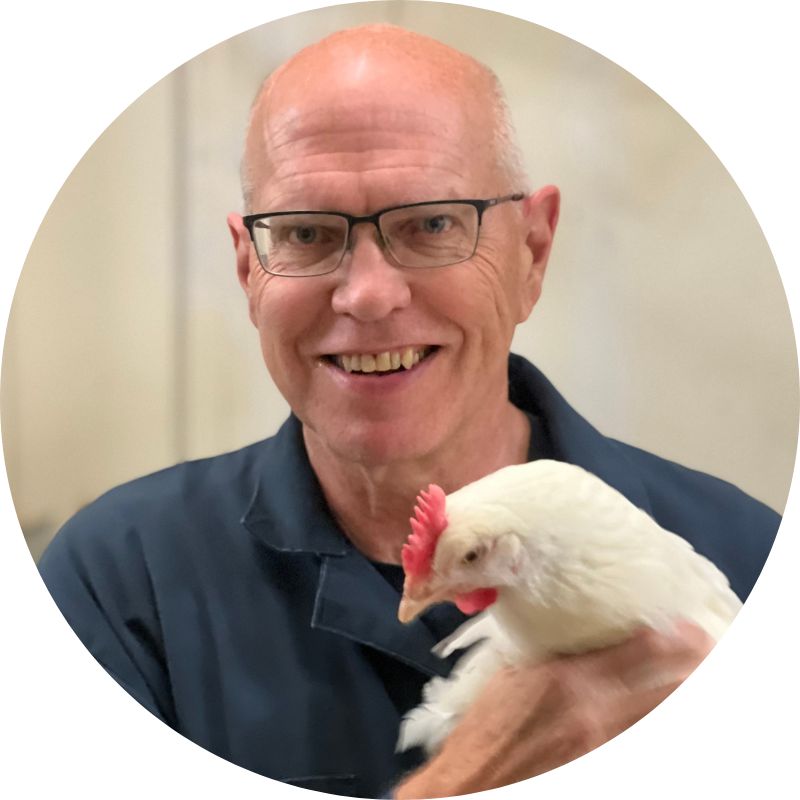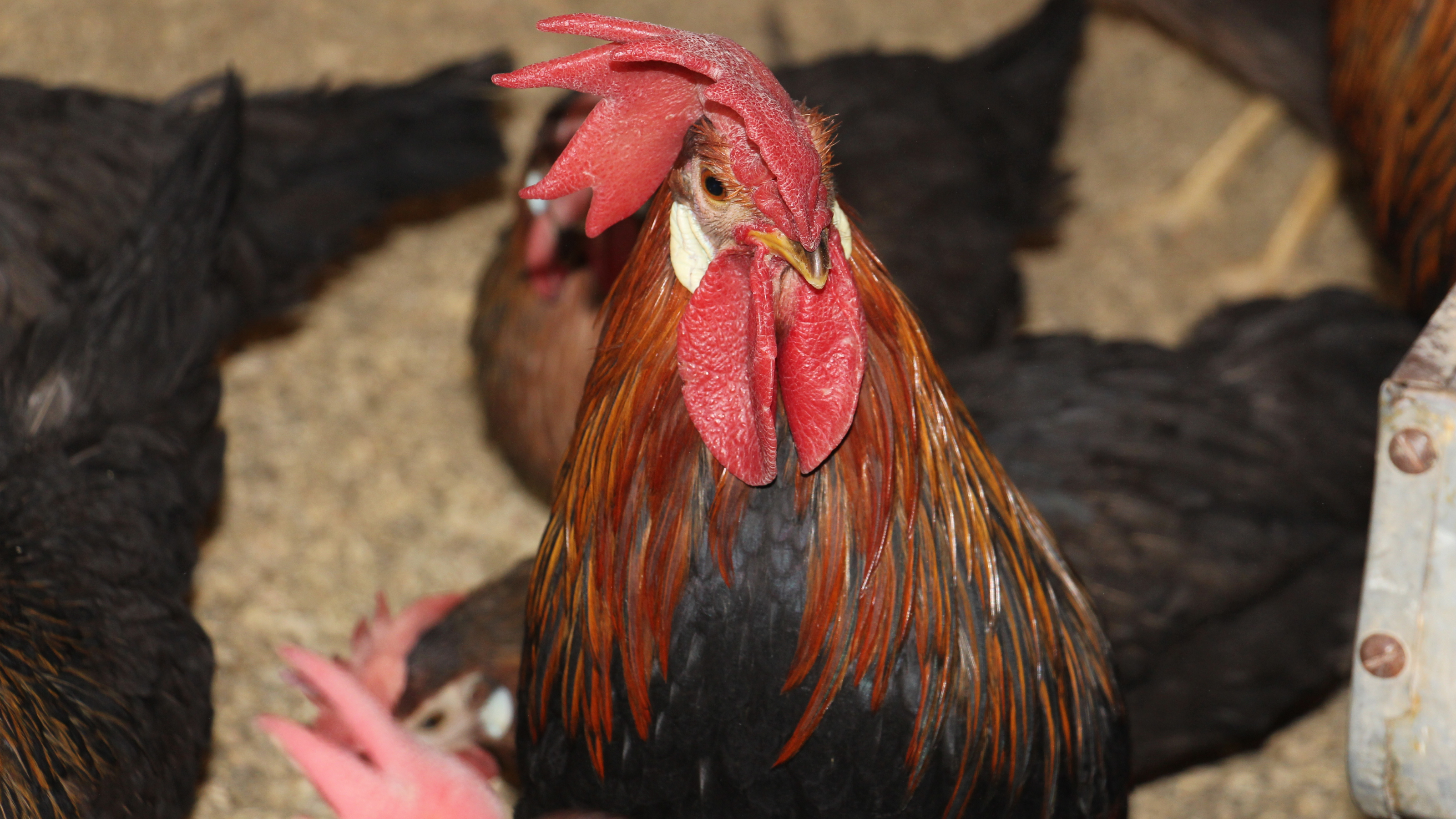This summer the University of Alberta Botanic Gardens are hosting Learning and Discovery Moments; experiences included with the price of admission that inform, inspire and entertain. Going beyond the stunning natural areas, cultivated gardens and plant collections of the gardens, this series allows visitors to connect with leading University of Alberta experts including faculty, researchers and staff.
One of these experts is Dr. Frank Robinson, an internationally-recognized poultry researcher whose talk will answer the question: what’s it like to be a chicken in 2022? To get an idea of what he will be sharing, I interviewed Frank to bust a few myths about chickens and learn a bit about his research and career at the U of A.
What is something about your work that might surprise people?
Chickens are a real science subject. I went to school for almost 10 years studying chickens, and one of the last things my dad said to me was, “I can't believe you went to university that long to learn about chickens.” As populations grow while our land base shrinks, agriculture has a major responsibility in feeding the world. I take that very seriously as a researcher — making chicken production more efficient.
Something else many people don't realize is that a lot of our agriculture and animal health students don’t come from a farming background. I've been working for the last five years trying to help as many students as possible get experience on farms. So far I've placed about 300 students where they go in and get their hands and feet dirty working on farms for three days. It's not a visit for agrotourism — it's a hard working job. I plan to expand that program and make it so that all of our students can access work-integrated learning programs; opening the doors so they can realize their potential.
What’s an important or interesting fact about chickens that you think should be more widely known?
Everybody thinks that broiler chickens grow really, really fast, because we administer hormones and force feed them or we take genes out of bison and put them in chickens to make them grow bigger. None of that is true. Modern commercial chickens grow bigger because of the role of genetics, nutrition and health management. Everybody's working hard to make them better. The genetics work has been amazing — 30 years ago it took 2.1 units of feed to a unit of gain; now it’s about 1.5. It’s like the way that car manufacturers are working to improve gas mileage.
How do academic lectures compare to public sessions like the learning and discovery series?
Public education sessions without the pressure of grades and curriculum is like free-range learning. As a poultry person, I enjoy teaching where learners can “peck outside of the box”, like free range chickens can. I used to fly a lot, doing talks pretty much everywhere in the world, and I did some of my best teaching on planes. I was a chicken gynecologist; so a lot of my slides were fairly graphic. You could always tell when somebody beside you was looking at your laptop screen, and eventually, they would say, “who are you, and what do you do”? When people were captive and seat-belted in, they were in a perfect space to ask everything they’ve ever wanted to know about chickens and farm animals. That's the very best teaching you can do.
What’s one fun fact that someone will learn/has learned at your Learning and Discovery session?
I love busting chicken myths. The reasons for egg and yolk color can be eye opening. It all depends on what the hen eats. For example, in Mexico they’re sometimes fed marigold petals and special chili peppers to make dark red yolks.
I also like to play class games like “Name that Tool”, which features animal agriculture equipment that most people have no idea about. I like to add these little snippets to grab people’s interest, get them to ask questions, and we go from there.
How is your work making a difference?
Before I went into university administration, I had a very large broiler research program, helping farmers around the world become more efficient. I researched how to improve reproductive efficiency so that fast growing chickens could lay more eggs and make the next generation (of chickens).
I've taught probably about 1500 students in over 46 introductory animal science classes over the last 35 years, and had students do all kinds of quirky creative things. The last two years I managed a game called ‘The Game of Farm Life' where groups of students actually designed a farm with a farmer over eight weeks.
The whole goal is agricultural fluency; explaining what a real farm is like and to talk about the issues that farmers are facing in feeding the world.
This conversation has been edited for brevity and clarity.
The Chicken Chat with Professor Frank Robinson will take place on July 16.
Visit the University of Alberta Botanic Garden upcoming events web page for all upcoming Learning and Discovery Moments.

About Frank
Dr. Frank Robinson, a Professor of Poultry Production and Physiology, has served the U of A in several administrative positions including Vice-Provost and Dean of Students (2008-2014). He was inducted into the Alberta Agriculture Hall of Fame, the Canadian Poultry Research Hall of Fame, was awarded a 3M National Teaching Fellowship and is a Fellow of the North American Colleges and Teachers of Agriculture and the Poultry Science Association. Through creative endeavors in engaging undergraduate students in experiential learning and promoting active industry integration, Frank has helped students find their careers in animal and poultry science, agricultural community development and research. He gives many talks to public groups each year about animal agriculture, and is recognized locally, nationally and internationally for expertise in small flock and large commercial poultry production.
